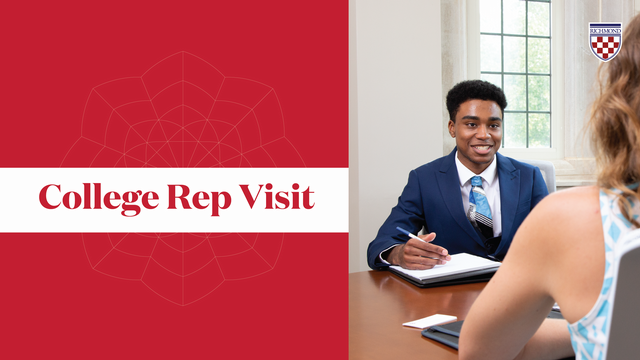Making the Most of College Rep Visits
Senior year is here, and you’re ready to dive into the college process! Between new classes, homecoming excitement, and reconnecting with friends, fall also brings another important item to your calendar – meeting with college representatives who visit your high school.
These visits, usually 20-40 minutes long, are one of the best ways for you to learn more about a school directly from an admission officer. It’s your opportunity to learn more about the application process, academics, and campus culture – and ask the questions that matter most to you. Here’s how to make the most of the visit.
Before Your Visit
Know Your Priorities
The college search is all about you. What are your non-negotiables? Do you want a close-knit community or a large university? Do you want an urban, suburban, or rural setting? Clubs open to everyone or ones you need to try out for? Knowing your “must-haves” acts as a mental checklist while you listen and ask questions.
Do Your Research
Take the time to learn the basics before you meet with a rep – academic offerings, unique programs, class sizes – so you can focus your questions on deeper topics. In addition, take time to look into social fit and consider variables like campus culture and student support services as well as financial fit. Doing your homework helps you avoid broad questions like “How’s your X major?” and instead prompt a meaningful conversation.
Talk to your Counselor
Your college counselor is a valuable source of information during all stages of your college search and application process. At this stage, it is a great idea to discuss what you are looking for in an institution so that they can help recommend specific programs or schools to explore. If you do not have a school counselor or are not sure who your school counselor is, don’t panic! You can still accomplish a lot of the prep work on your own – we even have a resource for students who are navigating the college process without a counselor.
If You Have a Scheduling Conflict
One of the colleges on your list is visiting this Thursday at 9am – a perfect opportunity to connect with the admission officer. Except, wait! You have a history test during that block that you can’t miss. What do you do? First, don’t panic. We understand that scheduling conflicts come up! Email the rep with your questions ahead of time or ask a friend to take notes for you or to pick up an extra brochure. Remember, academics come first. And, you can connect with colleges in other ways: emailing, visiting campus, or talking to a current student.
During Your Visit
Listen and Engage
Most college rep visits include a short info session followed by a Q&A. Listen closely, review any print materials, and ask the questions you prepared.
Ask Thoughtful Questions
The best way to learn more about the college is to ask those questions that you brainstormed before the visit. Questions about academics, the application process, and school culture are all on the table. One quick note: admission reps know a lot, but if your question is highly specific to a department, they may need to follow up later.
Stay Connected
Before you leave, make sure you have your rep’s contact information – whether that’s a business card or their email. Having a direct point of contact means you can easily follow up with questions. Building this connection now can make it easier to navigate the application process later.
Small vs. Large Visits
Some college rep visits are small, with only you and the college rep present. That is a great time to go in depth about your questions! Some college rep visits are large with many students at your school who are interested in the same college. That’s okay, too! During those larger visits, if you are unable to get your specific question answered, be sure to get the rep’s contact information to email them with your question afterwards.
After Your Visit
Attend More Visits
Continue to attend visits and learn more about the different schools on your list. Seeing how different schools compare in academics, aid, and campus life can help you refine your list. Each visit adds a data point as you craft your list of schools you’re applying to.
Keep in Touch
Admission representatives are here to help – email is typically the best way to stay in contact. Don't message us just to message us, but if you can’t find an answer during your research, that’s the perfect time to get in touch.
Visit Campus (If You Can)
Visiting a campus in person allows you to visualize how you would fit and thrive in that community. If your schedule doesn’t allow for an in-person visit, a virtual visit is a great option, too.
Connect with Students
While hearing from representatives can be beneficial, sometimes a student perspective proves to be more helpful during the college search process, as it provides a more firsthand experience. Visit a school’s website to look for ways connect with current students (shameless plug, check out our informational chats with current students).
College rep visits are a chance for schools to come to you – and for you to gather valuable insights before applying. Make the most of these opportunities, and you’ll be better prepared when it’s time to submit your applications. We hope to see you soon!
